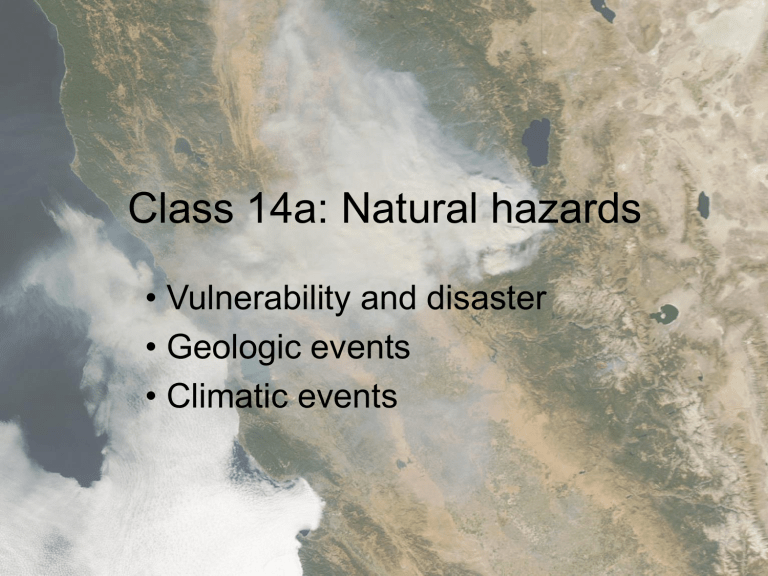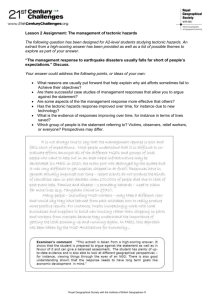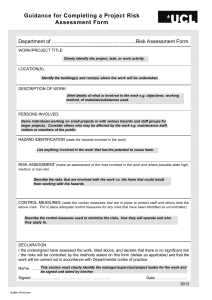Class 14a: Natural hazards • Vulnerability and disaster • Geologic events

Class 14a: Natural hazards
• Vulnerability and disaster
• Geologic events
• Climatic events
Natural hazards and disasters
• Natural disaster: damage to life or property
• Natural hazard: risk of natural disaster
• Combination of physical and human geography
• Droughts, floods, hurricanes, earthquakes, volcanoes
Natural hazards and disasters
• Trigger events are natural
• But “disasters” are man-made
• Humans can increase risk
– Building on a hillside
• Or increase vulnerability
– Building in a floodplain
Four types of impacts
• Direct damage
• Emergency response hampered
• Short-term service interruptions
• Long-term economic loss
1906 San Francisco Earthquake
• Sunday 5 A.M.; 40 seconds; 8.2 magnitude
• 3000 dead; 3/5 of housing, all of CBD
• Multiple, interrelated hazards
– Earthquake led to fire
• Failure of “lifelines”
– Water mains and tanks ruptured
1906 San Francisco Earthquake
• Learning from mistakes
– Structural damage stronger codes
– Larger water supply (Hetch Hetchy)
• Or not!
– Reservoir on fault line
– Fire debris became Marina District
1989 Loma Prieta Earthquake
• Weekday, 5 P.M; 15 sec.; 7.1 magnitude
• 62 dead; 12,000 homeless; $6 billion
• Interrelated hazards
– Worst damage on fill from 1906
• Failure of lifelines (Bay Bridge)
Natural hazards and disasters
• Most deaths in poor countries
• Squatter settlements, unclaimed land
• Few warning systems, evacuation plans
• Few building codes
• Deliberate risks
Bam, Iran
12/26/2003
Hurricane Jeanne (2004)
• 2,000 dead in Haiti; 12 in Dominican Rep.
• Haiti is 98% deforested
• Very poor, very high birth rates
• French land system: land divided by heirs
• 71% of fuel from charcoal (wood)
• No early warning system
Natural hazards and disasters
• Most property damage in rich countries
• Loss of life avoided
• Prime real estate often disaster-prone
• More reporting, reimbursement
• “Solutions” may give false sense of security
1991 East Bay Hills Fire
• Oct. 20: 25 dead, 2,700 homes, $1.5 billion,
5,100 homeless: 9 hours
• Risk factors
– Vegetation (flammable eucalypts)
– Fire suppression policy
– Wood houses, decks
– Narrow, winding roads
1991 East Bay Hills Fire
• Interrelated hazards: drought, fire
• Failure of lifelines: narrow roads, incompatible fire equipment
• Rebuilt immediately (high property values)
• But with vegetation, material restrictions
Four stages of response
• Preparation and readiness
• Emergency response
• Recovery (short- and long-term)
• Mitigation
Types of mitigation
• Warning systems, evacuation planning
• Building regulations
• Land use planning and land acquisition
• Education
• Habitat protection/restoration


